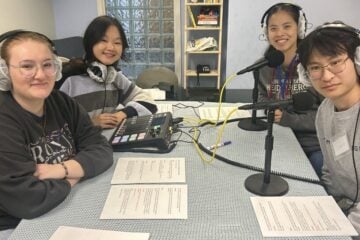GBH, community group reach tentative agreement on sale of CAI home

© Google Earth 2024
CAI's building in Woods Hole, Mass.
A local community group expects to buy the building that has housed radio station CAI in Woods Hole, Mass., since 2000 from its owner, GBH in Boston.
Though GBH anticipates selling the house to the Woods Hole Community Association, it still intends to find a new headquarters for the station.
“CAI is looking for a more suitable home nearby and will provide uninterrupted service during the move,” GBH and the WHCA said in a joint statement. “GBH and the WHCA are grateful for the community’s support throughout this process.”
“We did it,” Catherine Bumpus, president of the WHCA, wrote in a Friday update on savewcai.com. “… [W]e have raised the money needed to purchase the historic Captain Davis House.”
The organization said it was looking to raise $1.9 million and has pledged $375,000 toward the effort. Bumpus wrote that WHCA’s board voted Thursday during an emergency session to move forward with the purchase and that the closing date will be Jan. 16.
“We’re aware that many of you have questions about the sale, the building, and its future—please have just a little more patience,” she said. “For legal reasons, we need first to finalize the purchase of the building, before discussions move wider.”
The group is now collecting the funds that were pledged. “… [W]e are asking you to fulfill your pledges and send your money as quickly as possible,” she wrote. “Obviously, checks need time to clear, online donations need time to process.” More than 250 people donated, she said.
In the joint statement, GBH and the WHCA call the potential sale “a win-win for both organizations that care about the community. The sale will enable GBH to invest in the local journalism that CAI provides to the Cape and Islands while also enabling local ownership of a historic property.”
The WHCA has offered GBH five years to continue using the building rent-free, according to a Nov. 24 update on savewcai.com.
GBH originally said in November that it had accepted an offer to buy the building. After community members spoke out against the sale, CEO Susan Goldberg said in a Facebook post that the move was necessary because CAI was losing $500,000 per year and needed upgraded studio space.
“We need a new studio not only because we cannot afford to stay where we are, but for operational reasons, as well, including the need to upgrade our studio to meet specific broadcast standards,” Goldberg wrote.
Goldberg also apologized for not being “more collaborative in our decision-making about selling the property.”
“We certainly could have done a better job sharing our needs and challenges, and hearing from you about potential solutions,” she wrote.
CAI founder Jay Allison calls the community’s opposition to the initial sale a “cautionary tale” in an era of consolidation in public media. For an organization making a similar change, he said, “the consolidation may be a great efficiency, but don’t forget in the places that you are broadcasting, they care that you care about them specifically, not about your institution.” Allison is currently executive director of Atlantic Public Media, a production partner of CAI.
Allison said he sees the community’s rally to raise funds to buy the building as an “almost unbelievably positive outpouring of community affection for public radio and for localism. … This is about ‘We care about the place we live. We care about its media. We care about the structures of our town. And we will freaking well stand up and defend them.’ And I think all public media can learn a lesson from that. Trust your community.”
“A lot of people look to localism as a saving grace for journalism and public radio,” he said. “But it’s got to be done right. It’s got to be done with heart and it’s got to be connected. And you’ve got to trust the people on the ground. You don’t tell them what they want. They’ll tell you.”







